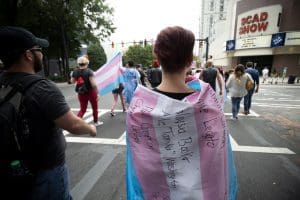Trump administration is ignoring Supreme Court ruling on LGBTQ discrimination
The administration has taken a piecemeal approach, experts say, continuing to target transgender Americans following the historic ruling.

Experts on LGBTQ equality say the Trump administration is uninterested in fully enforcing a Supreme Court ruling on workplace discrimination from earlier this summer, and that slow-walking that decision could have larger implications for the broader LGBTQ community.
According to those experts, Trump administration agencies have been slow to respond to the landmark ruling in Bostock v. Clayton County, which states that Title VII of the Civil Rights Act of 1964, which bars employment discrimination based on sex, also prohibits discrimination against LGBTQ people.
Other agencies have altogether denied the ruling’s relevance to other proposed regulations or decided to focus on certain parts of the decision and not others.
The court ruled this summer that “it is impossible to discriminate against a person for being homosexual or transgender without discriminating against that individual based on sex.”
On Monday, however, the U.S. Department of Education’s Office for Civil Rights decided it would only heed part of that decision, publishing two letters signed by Kimberly Richey, the acting assistant secretary for the Office for Civil Rights, that addressed how the department would respond to complaints of LGBTQ discrimination in light of the ruling.
In one letter, the office said it would investigate a complaint related to sexual orientation discrimination because of Bostock.
But in the second letter, Richey said that schools have a right to keep transgender students out of athletic teams that correspond with their gender and that schools that don’t discriminate against transgender students are not complying with the law.
The department argued that Title IX, the federal civil rights law that protects people from discrimination on the basis of sex in education programs and activities, is too different from Title VII for the recent Supreme Court decision to be relevant in this case.
Eliza Byard, executive director of GLSEN, a group focused on ending discrimination against and harassment of LGBTQ students, responded to the second letter this week, saying that the department’s actions were part of a “cruel and discriminatory” agenda.
“We urge the Department to cease these attacks and fully embrace the recent decision in Bostock that affirms what GLSEN has long known: Discrimination against LGBTQ+ people is prohibited under federal civil rights laws,” Byard said.
Sharita Gruberg, senior director for the LGBTQ research and communications project at the Center for American Progress, explained in a brief released last week that there are many reasons to think Bostock has much wider reach for LGBTQ people than simply employment discrimination.
Gruberg wrote that Title IX’s language is “closely modeled” on Title VII’s language and that courts often look to case law on the latter for guidance on sex discrimination under Title IX.
In response to the Department of Education letters and the attempt to separate workplace and school discrimination, Gruberg said, “I can’t imagine working as a civil rights attorney and with a straight face claiming these are not related.”
“A government that actually did care about the law and ensuring that it is correctly enforcing it would direct a whole government approach to the enforcement of sex discrimination prohibition that would be inclusive of sexual orientation and gender identity,” she said.
Gruberg added that the difference between the letters shows how the administration has focused on policies that harm transgender people specifically.
Although the administration, and the education department specifically, has advanced regulations that hurt queer people’s rights, its anti-transgender actions have been particularly bold, she said.
“The difference between these two letters is also so in line with the way that they try to create a wedge between sexual orientation and gender identity,” she said. “… They have been more explicit and more public in their attacks on transgender people.”
Gruberg said the letter speaks to the “anti-trans animus” throughout the administration, including its proposed and current regulations rolling back Obama-era protections for trans people in health care, housing, and one of its first anti-LGBTQ actions, which was to rescind guidance that provided protections for transgender students.
The letters are just one example of how the administration has largely disregarded Bostock.
The Department of Housing and Urban Development has proposed a rule, for instance, that encourages discrimination against transgender homeless people in single-sex shelters. In June, Reps. Maxine Waters (D-CA) and Jennifer Wexton (D-VA) wrote to Secretary Ben Carson to raise concerns about the shelter regulation in light of the court’s decision in June.
Carson responded in July and claimed that the ruling “has no impact” on the proposed HUD rule.
The Justice Department has also failed to respond to the court’s decision in Bostock.
According to The 19th, the agency hasn’t withdrawn guidance on anti-LGBTQ employment discrimination since the Supreme Court ruling. It had claimed previously in 2017 that Title VII doesn’t protect LGBTQ workers from discrimination.
The department also filed briefs with the Supreme Court last year for the Bostock case, which argued against LGBTQ equality for workers.
Additionally, the Equal Employment Opportunity Commission issued its own guidance following the landmark decision this summer; that guidance avoids the words “transgender woman,” “transgender man,” or “nonbinary person.”
The guidance, instead, in one example refers to a person that “was identified as male at birth, but uses feminine pronouns and identifies as a female.”
Published with permission of The American Independent Foundation.
Recommended

Alaska House committee advances, expands proposal to bar trans girls from girls sports
Amended bill would add elementary, middle school and collegiate sports to limits in place for high school
By Claire Stremple, Alaska Beacon - April 16, 2024
Senate clears gallery, passes bill to arm Tennessee teachers
Covenant parents emotional in wake of vote
By Sam Stockard, Tennessee Lookout - April 10, 2024
Not if, but when: Parents of slain Parkland students urge Utah lawmakers to pass school safety bill
The parents of children killed in the 2018 Marjory Stoneman Douglas High School shooting have a stark warning for Utah lawmakers: “It’s not a matter of if, it’s a matter of when and where the next school shooting will happen.”
By Kyle Dunphey, Utah News Dispatch - February 21, 2024








































































